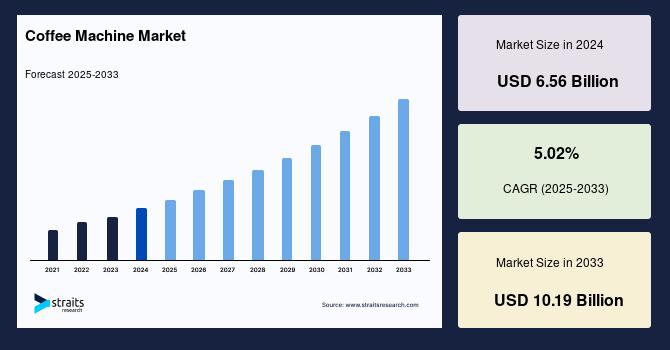Introduction
The global coffee machine market is experiencing significant growth, driven by increasing coffee consumption, technological advancements, and evolving consumer preferences. Coffee machines have become an essential part of daily life, catering to both residential and commercial needs.
Market Overview
According to Straits Research, the global coffee machine market was valued at USD 6.56 billion in 2024 and is projected to grow from USD 6.88 billion in 2025 to USD 10.19 billion by 2033, exhibiting a CAGR of 5.02% during the forecast period (2025–2033).
Key Market Drivers
1. Rising Coffee Consumption
The increasing popularity of coffee, especially in urban areas, is a significant driver for the coffee machine market. Changing lifestyles and busy routines have led to a surge in demand for convenient caffeine options, boosting the adoption of coffee machines in households and workplaces.
2. Technological Advancements
Technological innovations have transformed coffee machines, making them more user-friendly, energy-efficient, and capable of delivering barista-quality beverages. Features like smart connectivity, customizable brewing settings, and energy-saving modes enhance the overall coffee experience, attracting tech-savvy consumers.
3. Evolving Consumer Preferences
Consumers are increasingly seeking personalized coffee experiences, leading to the demand for machines that offer customization options such as adjustable grind sizes, brew strengths, and temperature controls. The trend towards specialty coffee and gourmet brewing methods further fuels the market growth.
Market Segmentation
By Type
-
Drip Coffee Machines: Widely used for their simplicity and ability to brew multiple cups at once.
-
Espresso Machines: Popular among coffee enthusiasts for making strong, concentrated coffee.
-
Capsule or Pod Coffee Machines: Known for convenience and consistency, using pre-packaged pods.
-
Bean-to-Cup Machines: Offer freshly ground coffee beans for a more authentic taste.
-
Steam Coffee Machines: Utilize steam pressure to brew coffee, often found in commercial settings.
-
Filter Coffee Machines: Common in households for brewing large quantities of coffee.
By Technology
-
Manual Coffee Machines: Require manual operation, offering control over the brewing process.
-
Semi-Automatic Coffee Machines: Combine manual and automatic features for a balanced experience.
-
Automatic Coffee Machines: Offer fully automated brewing, providing convenience and consistency.
-
Smart Coffee Machines: Feature IoT connectivity, allowing remote control and customization via smartphones or voice assistants.
By Application
-
Residential: Coffee machines designed for home use, catering to individual preferences.
-
Commercial: Machines used in offices, cafes, and restaurants to meet high-demand needs.
-
Office: Specialized machines for workplace environments, offering quick and easy coffee solutions.
By Sales Channel
-
Online: E-commerce platforms offering a wide range of coffee machines with customer reviews and ratings.
-
Offline: Physical retail stores providing hands-on experience and expert advice.
Regional Insights
-
Europe: Holds the largest market share, driven by a strong coffee culture and high consumption rates.
-
Asia-Pacific: The fastest-growing market, with increasing urbanization and disposable incomes leading to higher demand for coffee machines.
-
North America: Significant market presence, with a growing preference for specialty coffee and advanced brewing technologies.
-
Latin America: Emerging market with rising coffee consumption and adoption of coffee machines.
-
Middle East & Africa: Developing market with potential for growth in both residential and commercial segments.
Competitive Landscape
The coffee machine market is highly competitive, with several prominent players vying for market share. Companies like De'Longhi, Breville, Keurig Dr Pepper, JURA Elektroapparate, and Nestlé (Nespresso) are among the key players in the industry. These companies focus on product innovation, strategic partnerships, and expanding distribution channels to strengthen their market position.
Future Outlook
The coffee machine market is expected to continue its growth trajectory, driven by technological advancements, evolving consumer preferences, and increasing coffee consumption worldwide. Innovations in smart coffee machines, sustainable designs, and personalized brewing options will shape the future of the industry.
Conclusion
The global coffee machine market is poised for significant growth, fueled by rising coffee consumption, technological innovations, and changing consumer preferences. As the demand for convenient, customizable, and high-quality coffee experiences increases, the market presents opportunities for manufacturers to innovate and cater to diverse consumer needs.

